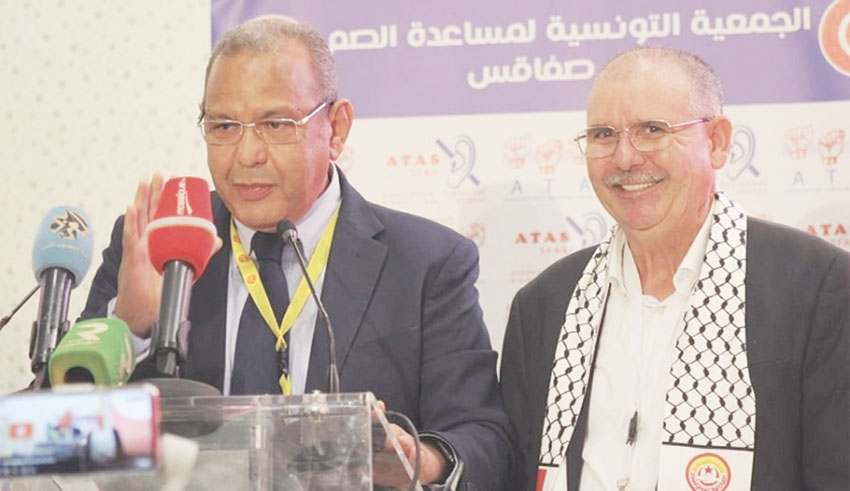The Ugtt opposes its refusal to a possible lifting of subsidies, the freezing of salaries and recruitment. A refusal which nevertheless leaves a way out in the event of consultations and negotiations with the union party within the framework of a new social contract which unites and does not divide.
The trade union center began, this Wednesday, February 16, the work of its 25e congresses which take place over three days in Sfax. The trade union high mass keeps the various actors in the country in suspense because of what may result from it, exceptional circumstances marked in particular by great economic difficulties, political divisions, social tensions, not to mention the talks of the Tunisian State. with the International Monetary Fund.
From the outset, the tone is set by the boss of the Ugtt, with specific messages addressed to political parties and many other parties, not suffering from any interpretation. The central trade union is committed to the independence of its decisions, freedom, democracy and social peace. “The future of the country will not happen without the Ugtt”will summarize Taboubi, outgoing secretary general and candidate for his own succession for a new five-year term.
More than 600 participants took part in the inaugural session in the presence of guests and representatives of Arab, African and European trade union organizations, as well as national organizations including the Tunisian Union of Industry, Commerce and Handicrafts , the National Bar Association , the Tunisian League for Human Rights, the Union of Tunisian Journalists.
Taboubi pleads for a new social contract
The outgoing secretary general of the Ugtt, Noureddine Taboubi indicated in his statement to the media that the congress is being held in exceptional circumstances. It is thus organized under the sign of the national will and will fully contribute to drawing the contours of the country’s future. The trade union center will fully assume its role in order to save the country from the serious economic crisis.
Taboubi mentioned the conflicts between different parts of the country without forgetting the very difficult economic situation which led to the deterioration of purchasing power, recalling in passing that the Ugtt has always been a force of proposal on which all parties could count. . However, he considered that the successive governments after the revolution lacked the skills to negotiate with international financing bodies and did not take into account the economic choices specific to Tunisia.
As for the negotiations with the IMF, the SG of the Ugtt affixed his refusal to a possible lifting of subsidies, the freezing of salary increases and recruitments. A refusal which nevertheless leaves a way out in the event of consultations and negotiations with the union party within the framework of a new social contract which unites and does not divide.
“Public enterprises in a catastrophic situation”
For his part, the president of the Tunisian Union of Industry, Trade and Handicrafts (Utica), Samir Majoul, declared on the sidelines of the congress that both his organization and the trade union center are called upon to put in place an economic recovery plan in order to present it, as soon as possible, to the World Bank and the International Monetary Fund (IMF). According to him, Tunisia is facing a difficult economic crisis that requires urgent solutions, but also the involvement of all stakeholders without conditions.
Majoul spoke of the need to stay away from political considerations in the economic field, in order to meet the challenges, believing that public companies are in a “catastrophic situation” and need urgent solutions.
As for the privatization of public enterprises, which had been a point of contention with the trade union organization, he underlined that this decision had become a necessity, recalling in this context the experiences of several countries, including China and Russia, which opted for this choice.
It should be noted that the general secretary of the International Trade Union Confederation, Sharon Burrow, participated in the opening session of the congress by videoconference. In her speech, she highlighted the activism of the Ugtt and its fight for democracy, decent work and in favor of rights, universal social protection, income equality, gender equality and races and, of course, inclusive society. “We will always support the Ugtt in its struggle for democracy in Tunisia, for the workers of Tunisia. We also know that the path you will have to travel is difficult and we express our full solidarity with you. Unity within the trade union movement is the only way to be able to combat the tendencies towards dictatorship, exclusion and, of course, the decline of fundamental rights and freedoms. Your struggle is ours”.
Protester in black armband
On the program of this congress, the election of a new executive office of the union with more than thirty candidates in the running including the current general secretary, Noureddine Taboubi. The amendment of article 20 of the statute of the trade union organization, by virtue of which the members of this office can be candidates and run for more than two mandates, had prompted other trade unionists to file a complaint with the court to annul the outfit of 25e Ugtt congress, but the court rejected it. In reaction to this complaint, the outgoing Deputy Secretary General of the Ugtt, Samir Cheffi, replied in media statements that “if differences are allowed within the central trade union, recourse to justice is synonymous with crime with regard to the internal regulations of the Ugtt”adding in passing that such actions could in no way disrupt the work of this congress.
By way of protest, the deputy secretary general of the Ugtt in charge of the private sector, Mohamed Ali Boughdiri, showed up for the work of the congress wearing a black armband. He felt that the trade union center “will soon lose its influence because of the latest acts perpetrated by a group of trade union leaders who have violated the standards of democracy and the status of the Union”, according to his statement reported by TAP. And to add that “these leaders authorized themselves to assume responsibility within the executive office by running again as a candidate in violation of the internal regime”.
–


